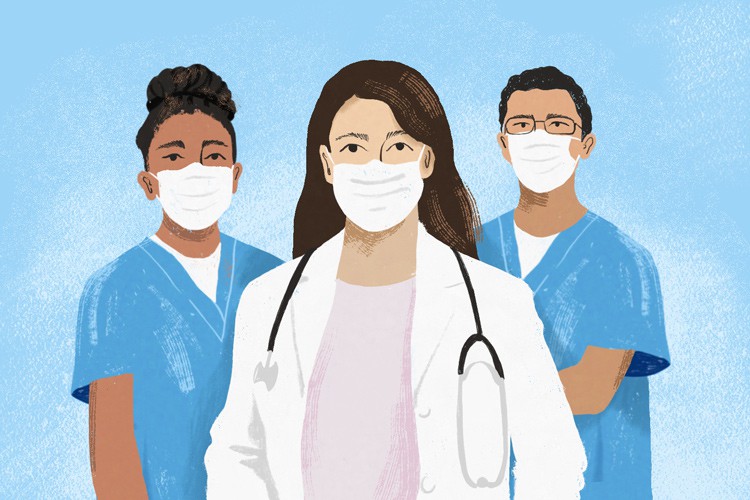
26 January 2021
Many health professionals are battling to cope emotionally with the surge in Covid-19 patients. Graphic: Lisa Nelson
“Emotionally, we are not coping. Seeing death at this rate every day is not normal,” says Mosima Doreen Mabeba, a nurse working in the intensive care unit (ICU) of a provincial hospital in Limpopo.
The second wave of the Covid-19 pandemic has hit the hospital hard, she says.
Of five patients on ventilators she cared for recently in the hospital, only one survived, she says.
“There was a lady who was intubated and then she got off the machine, now she’s fine, she’s at home. But unfortunately, we lost the other patients, mostly because of their age and comorbidities,” she says.
Mabeba leaves home in her uniform, only to take it off when she arrives at the hospital. Walking into the change room dressed in her uniform and walking out armed in personal protective equipment (PPE) is a constant reminder that things are not normal.
“We don’t wear our uniform when we go into the Covid ward and ICU. We wear the scrubs provided by the hospital and then we wear the PPE over it,” she says.
While her working hours have remained officially unchanged — 12 hour shifts, 40 hours per week — Mabeba says staff shortages have affected her work load and forced her to be flexible with her shifts.
Health professionals were already under pressure before the Covid-19 pandemic, says Dr Nokukhanya Khanyile, who works in the pediatric unit at a Johannesburg hospital.
“I don’t think we were even coping before Covid but we had to make do. Even though we’re quite efficient because we’ve had to work in hectic circumstances, it does become very strenuous when there are staff shortages. The existing staff has to cover the gaps and work extra calls to share the load.”
But, she says, health professionals have had no choice but to keep working because there are patients to care for.
“You have this push and pull within yourself. It’s like: ‘I’m exhausted, I can’t do another call but if I don’t do the call, who is going to do the call?’”
To overcome the physical exhaustion and emotional fatigue Mabeba says she has relied heavily on prayer. And, she uses the shower as a safe place to let go and cry.
“You need to help somebody with a clear mind even though you know this is not a normal situation. You know that somebody needs you emotionally, psychologically and physically, and you have to be there for them,” she says.
The suspension of visiting hours has meant that staff have to support patients who are isolated from their families and to deal with the families who are not allowed to view the body of a loved one who died. “It is really painful.”
“People are really struggling right now because we’re seeing a higher rate of death,” says Dr Precious Dohnodzo Chikura, who is completing her community service at the obstetrics and gynaecology unit at a district hospital in Mpumalanga.
“We are under a lot of pressure and we are at the coalface of seeing people in the last moments of their life,” says Chikura.
Healthcare professionals need a channel to express their fatigue and to debrief, says Chikura, who has founded Frontline Refuge, an online platform where mental health professionals offer therapy sessions free of charge to colleagues.
She says there is increased demand for mental health services for health professionals.
The International Council of Nurses’ (ICN) most recent report found that governments have failed health professionals by not ensuring that they have adequate mental health support.
“There is a huge hidden mental health risk to our nursing workforce submerged below the surface of the pandemic. ICN research indicates the real scale of the mental health legacy of Covid-19 will undoubtedly mean that sickness, absenteeism, burnout and nurses leaving the profession because of ill health will increase, making shortages even more severe and resulting in an unquantifiable loss of experience,” said Howard Catton, ICN chief executive officer, in a statement.
While Chikura appreciates the sentiment behind encouragements like “healthcare workers are heroes”, she says it creates a false impression that they do not buckle under the pressure or need support.
“There’s a danger in that hero label,” she says, adding that it puts health workers in a position where they have to over-perform all the time. “Looking at healthcare workers as heroes neglects the government’s responsibility to provide danger pay, and time off after experiencing trauma.”